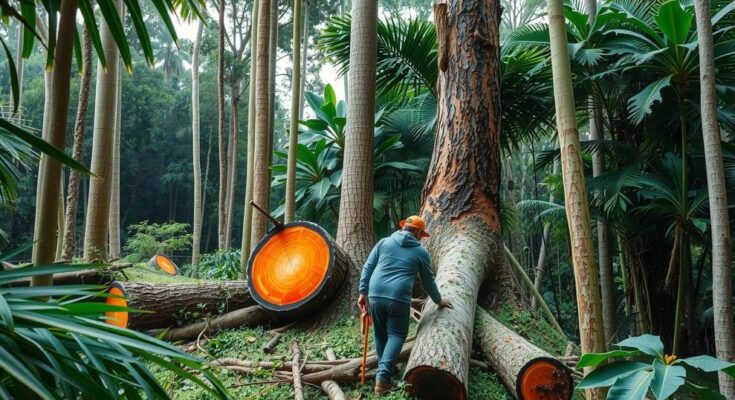Deforestation in the Peruvian Amazon is attributed to Mennonite colonies, sharply increasing from zero in 2017 to over 8,660 hectares by 2024. While significant agricultural development has been noted, concern exists regarding the legality and environmental implications of these actions, especially concerning Indigenous lands. Monitoring and government action are crucial for addressing these ongoing challenges.
Recent analyses utilizing satellite imagery have revealed persistent deforestation occurring in the Peruvian Amazon in the vicinity of Mennonite colonies, a collection of traditional Christian communities. Displaced from Europe since the 16th century, Mennonites have established large-scale agricultural practices in tropical environments, with their settlements emerging in Peru since 2017. Reports indicate that deforestation associated with these communities has escalated from negligible levels to over 8,660 hectares by 2024, highlighting a severe environmental impact.
The Monitoring of the Andean Amazon Project (MAAP), a respected nonprofit based in the United States, conducted a comprehensive analysis of the deforestation trends surrounding five specific Mennonite colonies—Chipiar, Vanderland, Osterreich, Providencia, and Masisea—finding ongoing deforestation activities as recently as September 2024. For instance, the newly established Chipiar colony has experienced significant forest loss, amounting to 2,708 hectares since 2020, with satellite visuals indicating notable deforestation and fire incidents.
Further observations from Global Forest Watch (GFW) suggest that many of these clearings may involve uncontrolled fires, initiated for land clearing purposes that have inadvertently spread to surrounding areas. Matt Finer, Director of MAAP, expressed uncertainty regarding the specific origins of these fires, emphasizing the distinction between intentional deforestation and the resultant fire damage.
As per previous investigations reported by Mongabay, the expansion of Mennonite agricultural settlements in Peru raises concerns about legality, particularly regarding land that overlaps with Indigenous territories. In light of this situation, officials have alerted the Peruvian government to address the recurring deforestation issues affecting the Chipiar and Vanderland colonies.
The Mennonites, originating from Europe in the 16th century, are recognized for their conservative Christian values and significant agricultural practices. Their migration journey led them through Canada and ultimately to Latin America, where they established various colonies to pursue agricultural ventures. In Peru, the emergence of Mennonite colonies has coincided with extensive deforestation in the Amazon, raising environmental concerns and complications surrounding land use and legality, especially regarding Indigenous rights and territories. Recent data have highlighted worrying trends of forest loss attributed to these communities, necessitating urgent intervention and strategic government responses.
In conclusion, the ongoing deforestation linked to Mennonite colonies in the Peruvian Amazon presents a multifaceted issue involving environmental degradation and potential legal violations concerning land use rights. The significant increase in deforestation from 2017 to 2024 underscores an urgent need for government intervention to protect the region’s ecosystems while addressing the complexities surrounding agricultural practices of these communities. Continued monitoring and legal frameworks will be essential to mitigate the impacts of such activities moving forward.
Original Source: news.mongabay.com




